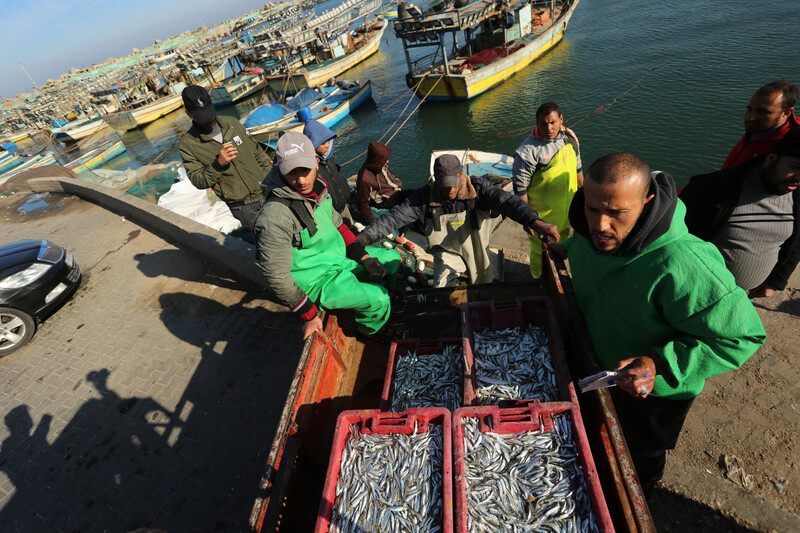Rights and Accountability 21 May 2020

Israeli forces have fired on Gaza fishers more than 100 times so far this year.
APA imagesIsraeli navy attacks on Gaza fishers spiked in April against the backdrop of increased economic uncertainty in the besieged territory amid COVID-19 restrictions.
Spring is the sardine fishing season, one of the most profitable harvests for Gaza fishers. Israel’s use of lethal force against Gaza fishers, particularly at a peak season, further undermines the fishing industry and food security in the coastal territory.
Gaza has been under a tightened Israeli blockade since 2007, severely debilitating its economy and plunging the territory’s two million residents, most of whom are refugees, into widespread poverty.
Three human rights groups are calling on Israel’s attorney general and military advocate general “to put an immediate end to the harassment of fishermen and investigate past incidents.”
Israel fired at fishing boats inside Gaza’s fishing zone more than 100 times in the first four months of the year, according to Al Mezan, a human rights group based in the territory.
Nearly 40 of those live fire incidents occurred in April, reflecting a 70 percent increase in the cases over the first three months of 2020.
Six fishers were injured and seven arrested during those incidents, and seven boats were badly damaged and one vessel seized.
Israel shot at Gaza fishers around 350 times in all of 2019.
Terror
A recent incident illustrates the terror Gaza fishers encounter when trying to ply their trade.
The Israeli navy fired rubber-coated metal bullets at two fishing boats on 8 May, hitting one fisher in the head and another in the hand. Naval forces used live fire against the boat engines, destroying them, and fired water cannons at the boats, injuring a fisher.
The human rights groups have drawn attention to how Israeli military policies “permit the use of force and live fire against fishermen in the absence of any immediate threat to human life.” Such policies violate the 1907 Hague Regulations – a cornerstone of international law which prohibits the targeting of vessels used exclusively for fishing.
Israel announced changes in access to Gaza’s coastal waters around 20 times last year as Prime Minister Benjamin Netanyahu has treated its fishing industry “a lever for pressure” over the territory’s population as a whole.
Israeli military bodies have openly admitted to using Gaza fishing restrictions as a form of collective punishment.
The punishment of a civilian population over acts for which they bear no responsibility is prohibited under the Fourth Geneva Convention, which was ratified by Israel.
The International Committee of the Red Cross holds that the air, land and sea blockade on Gaza “constitutes a collective punishment imposed in clear violation of Israel’s obligations under international humanitarian law.”
Crimes at sea
Palestinians are pursuing investigations of alleged Israeli war crimes at the International Criminal Court.
Palestinian human rights groups largely welcomed a recent response from court’s chief prosecutor reaffirming jurisdiction in the occupied West Bank and Gaza Strip.
But those groups object to the prosecutor’s omission of Palestine’s Exclusive Economic Zone (EEZ) from her understanding of the court’s jurisdiction.
The EEZ is a sea zone over which a state has special rights for exploration and resource extraction, stretching 200 nautical miles from its coast.
In September last year, having acceded to the UN Convention on the Law of the Sea, the State of Palestine declared its maritime boundaries, including its EEZ.
Palestinian human rights groups have posited that if a state is authorized by that UN convention “to exercise exclusive jurisdiction over EEZ natural resources as a sovereign right, then it is equally within the jurisdiction of the coastal state to exercise its jurisdiction over relevant Rome Statute crimes in that area.”
Rome Statute crimes are international crimes that would fall under the ICC’s purview. The four core international crimes established by that statute are genocide, crimes against humanity, war crimes and the crime of aggression.
The rights groups pointed to Israel’s naval blockade of Gaza’s coastal waters, “the harassment and attacks on fisheries workers, and the pillage of natural resources at sea and on land.”





